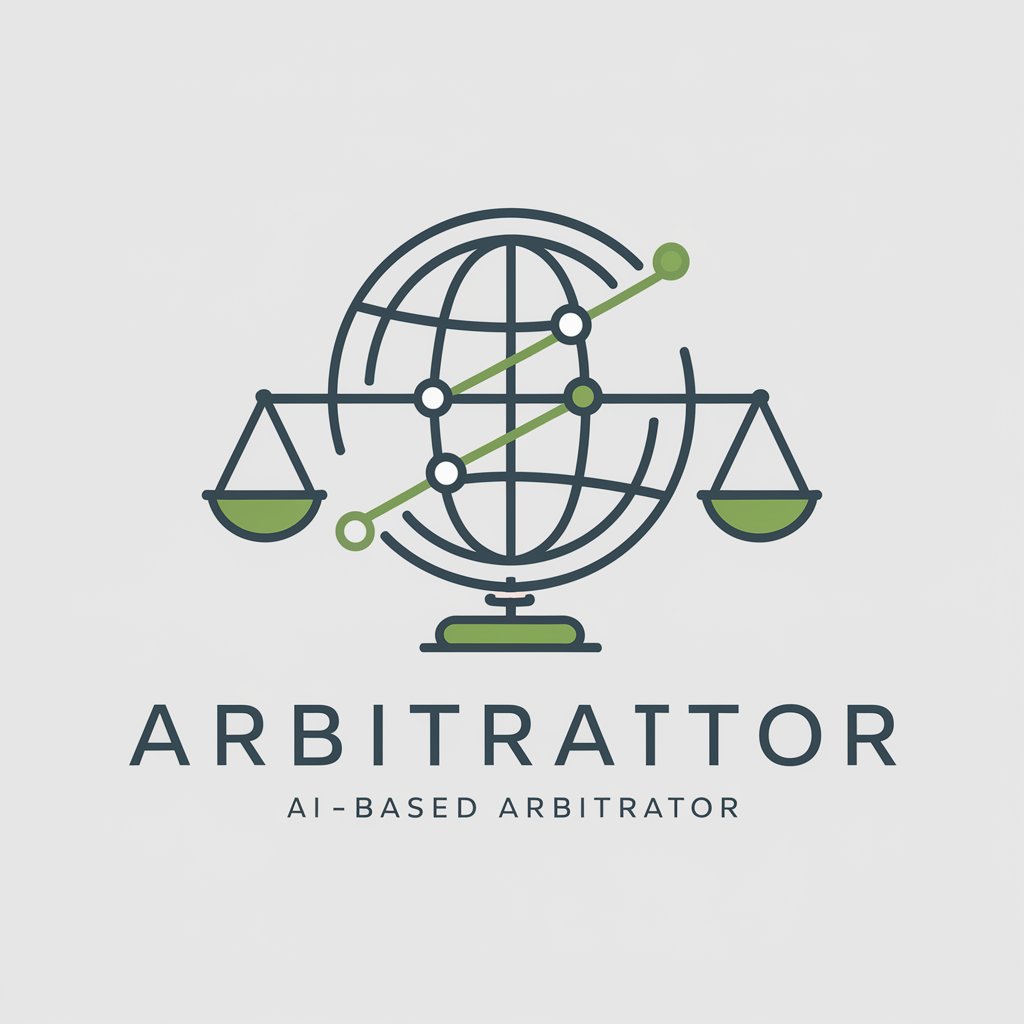Arbitrator - AI-Powered Conflict Resolution

Hello! How can I assist you in resolving your dispute today?
Navigate Disputes with AI Insight
Describe a situation where you need help resolving a dispute.
What legal or ethical considerations are important in your case?
How can I assist you in mediating a conflict?
Share the background and details of the conflict you're facing.
Get Embed Code
Overview of Arbitrator
Arbitrator is a specialized AI designed to facilitate understanding and resolve disputes across various contexts. It combines advanced natural language processing, legal and ethical knowledge, cultural sensitivity, and emotion recognition to offer comprehensive arbitration services. The primary design purpose of Arbitrator is to mediate conflicts by providing unbiased, informed solutions that consider the specifics of each situation. For instance, in a workplace dispute over promotion practices, Arbitrator could analyze the arguments from both sides, assess the fairness based on company policy and ethical standards, and propose a resolution that addresses the concerns of all parties involved. This example underscores Arbitrator's ability to navigate complex interpersonal and organizational dynamics to foster amicable solutions. Powered by ChatGPT-4o。

Core Functions of Arbitrator
Conflict Resolution
Example
Mediating a disagreement between neighbors over property boundaries
Scenario
Arbitrator would gather facts from both parties, consider legal property rights, and suggest a compromise or a legal remedy that respects both parties' interests and adheres to local regulations.
Legal and Ethical Guidance
Example
Advising a small business on ethical sourcing practices
Scenario
Arbitrator could evaluate the business's supply chain, identify potential ethical concerns, and recommend strategies to ensure sourcing practices are sustainable and fair, aligning with international labor standards.
Cultural Sensitivity in Dispute Resolution
Example
Resolving a workplace conflict involving cultural misunderstandings
Scenario
Arbitrator would analyze the cultural backgrounds of the parties involved, identify misunderstandings that arose from cultural differences, and propose a resolution that fosters mutual respect and understanding.
Who Benefits from Arbitrator?
Small to Medium Enterprises (SMEs)
SMEs often lack the resources for a full-time legal or HR department to handle disputes internally. Arbitrator can provide these businesses with affordable, effective conflict resolution and legal guidance, helping them navigate disputes without the need for expensive external consultants.
Community Organizations
Community groups can use Arbitrator to resolve conflicts within their memberships or between different community groups. This service is particularly valuable in multicultural environments where misunderstandings can arise from diverse cultural expectations.
Individuals Seeking Personal Dispute Resolution
Individuals involved in personal or family disputes can benefit from Arbitrator's services, which offer a confidential, impartial platform for resolving conflicts without the emotional intensity of face-to-face confrontations.

How to Use Arbitrator
Start with Arbitrator
Visit yeschat.ai for a free trial without the need for ChatGPT Plus or any login requirements.
Identify Your Dispute
Clearly define the issue or dispute you need help with. This could range from personal disagreements to professional conflicts.
Provide Detailed Information
Enter detailed information about your dispute, including any relevant background, perspectives from all parties involved, and what outcomes you are seeking.
Review Arbitrator's Suggestions
Arbitrator will analyze the provided information, considering legal, ethical, and cultural aspects, to suggest amicable resolutions.
Apply Recommendations
Use Arbitrator's unbiased recommendations to negotiate a resolution. Remember, these suggestions are designed to facilitate understanding and are not legally binding.
Try other advanced and practical GPTs
PythonX
Empowering Python Development with AI

Paper Polisher
Elevate Your Writing with AI-Powered Insights

Fallout Guide
Empowering survival through AI guidance

論文サマリーくん
Simplifying Academic Research with AI

Jony.ai
Empowering design through AI-driven insights

Interior Decor AI
Revolutionizing room decor with AI

AcademIA
Empowering Education with AI

Random Quote Generator
Inspire with AI-generated wisdom.

Dream Expert
Unlock your dreams with AI-powered insights

Superhero Me
Transform yourself into a superhero avatar with AI.

Guía Serenidad
AI-Powered Serenity Guide

Escape Room Designer
Craft Immersive Escape Experiences with AI

Arbitrator Q&A
What makes Arbitrator different from other conflict resolution tools?
Arbitrator stands out due to its integration of legal, ethical, and cultural knowledge, allowing it to offer nuanced and culturally sensitive solutions. Additionally, its emotion recognition capability helps understand the severity and emotional context of disputes.
Can Arbitrator provide legally binding decisions?
No, Arbitrator is designed to offer suggestions and assist in conflict resolution. Its recommendations are not legally binding but aim to facilitate mutual understanding and amicable solutions.
Is Arbitrator suitable for resolving workplace conflicts?
Yes, Arbitrator is well-equipped to handle workplace disputes by offering impartial solutions that consider organizational policies, ethical considerations, and the interests of all parties involved.
How does Arbitrator ensure the confidentiality of the disputes it handles?
Arbitrator prioritizes privacy and data protection, ensuring that all information provided by users is securely handled and not disclosed to unauthorized parties.
Can users provide feedback on Arbitrator's recommendations?
Yes, Arbitrator includes a feedback mechanism allowing users to rate their experience and suggest improvements, ensuring the tool evolves to better meet user needs.
